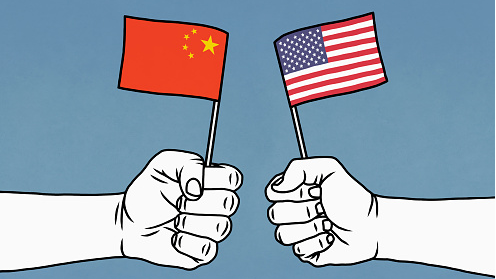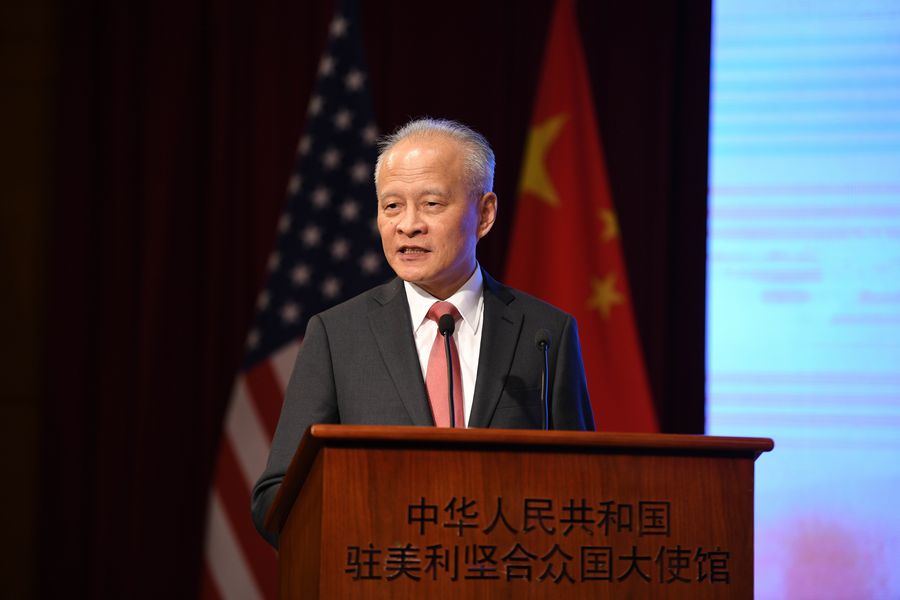
Editor's note: Stephen Ndegwa is a Nairobi-based communication expert, lecturer-scholar at the United States International University-Africa, author and international affairs columnist. The article reflects the author's opinions and not necessarily the views of CGTN.
All eyes are set toward the first Sino-U.S. meeting planned between top officials of the two countries on March 18 in Alaska, the U.S. state on the northwest extremity of the country's West Coast. The forthcoming meeting is the first face-to-face diplomatic contact between the two countries since President Joe Biden's inauguration on January 20.
The Alaska venue is symbolic of the current chilly relations between the two countries. For four years, courtesy of former President Donald Trump, the U.S. and China have been involved in a game of ping-pong involving accusations and counter accusations on various bilateral and multilateral issues.
But the world is now weary of this tension and expects a thawing of relations between the duo amid the hard stance taken by the U.S. in relation to its standpoints, and its continued belligerence in the Taiwan Straits. While it is encouraging that the meeting has been called by the U.S., which shows the possibility of rapprochement, experts also see it as an attempt by the U.S. in setting the meeting's agenda.
The tone by Secretary of State Antony Blinken on March 10 in an address to U.S. lawmakers was telling: "This is an important opportunity for us to lay out in very frank terms the many concerns that we have with Beijing's actions and behavior that are challenging the security, prosperity and the values of the United States and our partners and allies."
Generally, the two sides are expected to engage in a high-level strategic dialogue on issues ranging from national security and trade to economy and human rights.
One of the issues will definitely be the trade war that Trump set off and escalated on the pretext that China had slapped high tariffs on U.S. exports. However, subsequent sabotage of Chinese businesses betrays the real intentions of America's actions.
The second issue the world will be waiting to hear about is cooperation between the two countries in the fight against COVID-19. Incidentally, the two countries are on the extreme sides of the coronavirus spectrum.

Chinese Ambassador to the United States Cui Tiankai. /Xinhua
Chinese Ambassador to the United States Cui Tiankai. /Xinhua
On one hand, China has managed to effectively subdue the pandemic at home due to strict measures and goodwill from citizens. It is estimated that the most populous country in the world has recorded just over 4,800 deaths and slightly more than 100,000 cases. The U.S., on the other hand, has recorded an estimated 540,000 fatalities and over 29 million cases.
The evidence of who is doing things right and who is on the wrong is stark. It seems the U.S. is the bane afflicting China's willingness and efforts in stemming the COVID-19 tide across the rest of the world. The U.S. must commit itself to pull its weight in stopping this global catastrophe.
While the U.S. greatly prides itself for freedom of speech, it has also become a center of fake news. China rightly accuses the superpower of spreading malicious rumors on its internal affairs, like creating the impression that the Chinese government is involved in genocide against the Uygur Muslims in northwest China's Xinjiang Uygur Autonomous Region. The fact that the autonomous region has developed rapidly in recent decades and transformed people's lives is a source of envy.
Another instance is the interference in the governance of Hong Kong, the latest being opposition to the new changes to the special administrative region's electoral laws that require patriotism for those seeking public office. The U.S. needs to take heed of comments by Chinese Ambassador to the U.S. Cui Tiankai, who in a recent opinion published in the South China Morning Post warned that using democracy to meddle with others' internal affairs goes completely against the spirit of democracy.
These two issues should not actually be on the table as they have nothing to do with the U.S. insofar as relations between the two countries are concerned. China does not really have to explain itself to Uncle Sam for doing what it deems best for its people. The U.S. should stop whipping a dead horse by forcing issues that have already been openly addressed.
Another pertinent issue is the threat posed by climate change. By default, both countries contribute the most to greenhouse gas emissions by virtue of their positions as the largest economies in the world. But then again, the commitment to following through on the mitigation measures against global warming by one of the parties leaves a lot to be desired.
The U.S. is obviously the bad boy here, at least going by Trump's withdrawal from the Paris Accord, the United Nations Framework Convention on Climate Change, on climate change mitigation, adaptation and finance. But to give credit to Biden, he revoked the withdrawal and has shown great dedication to tackling climate change in word and deed.
Well, China must avoid being pushed by the U.S. into the Thucydides Trap as the latter maintains its zero-sum geopolitical stronghold. Undoubtedly, in Blinken's remarks made a week ago, the relationship between the U.S. and China is the world's "biggest geopolitical test" of the century.
(If you want to contribute and have specific expertise, please contact us at opinions@cgtn.com.)

